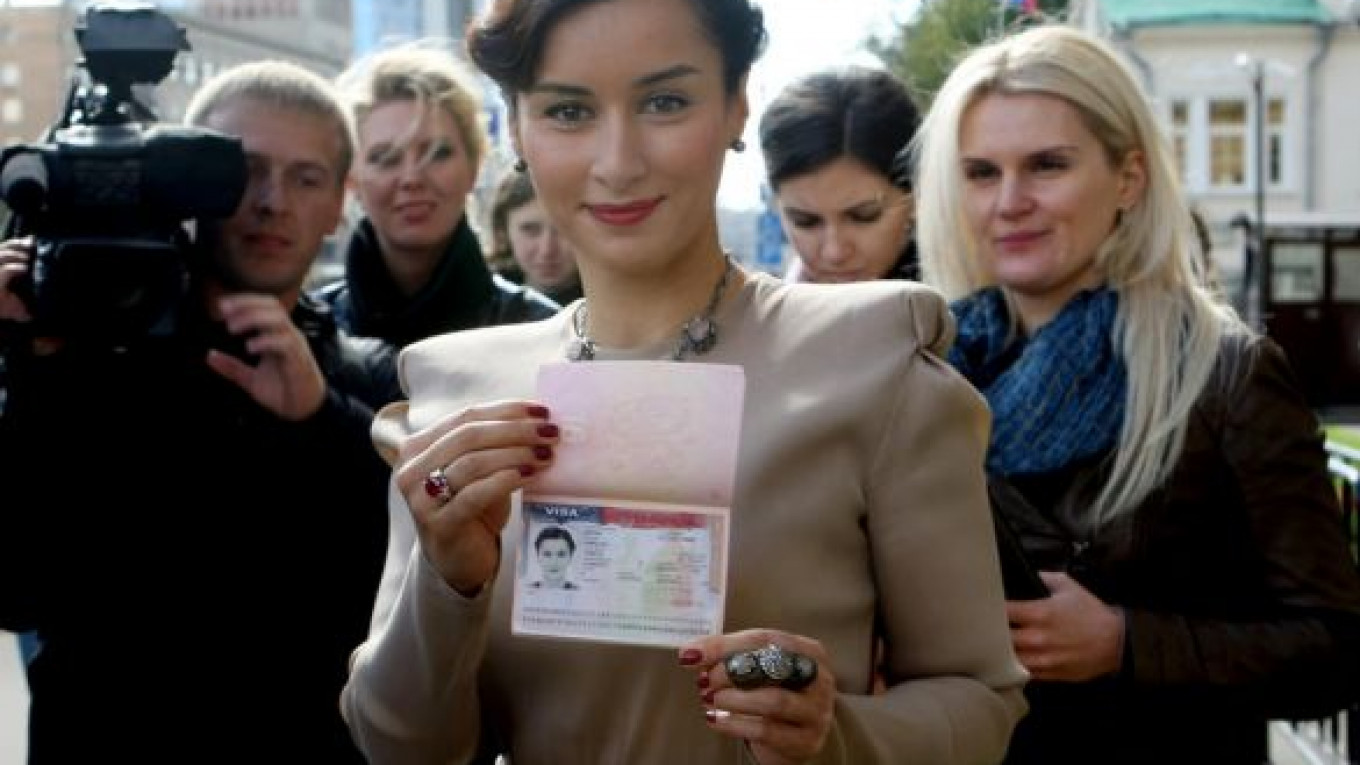Television star Tina Kandelaki became the first Russian to pick up a three-year U.S. visa on Monday, one day after the much-touted visa facilitation agreement between both countries went into force.
Kandelaki said she was chosen because of her popularity on the Russian Internet. "I want to tell you that this happened because of you, dear friends," she wrote on her blog. The U.S. Embassy also published a photo of her holding up her visa.
It remained unclear how Americans would fare in Russian consulates because no practical results were available as of Monday night. However, the Russian Embassy in Washington published some far-reaching details about the agreement's implementation.
Many U.S. citizens living in Russia will for the first time be able to invite friends and family members simply by having an invitation notarized and submitted with the applicant's paperwork, according to the website of the embassy's official visa agency, Invisa Logistics Services.
The new rules for so-called private visas are a massive improvement on the previous regime, whereby only U.S. citizens with residency permits — which are extremely hard to get — and Russians can request official invitations from the Federal Migration Service, a process that usually lasts 30 days. That regime still applies to most other Western foreigners.
Similarly, companies no longer have to bother obtaining business visa invitations through the Federal Migration Service, but can simply write them using their own official letterhead. The same applies for nongovernmental organizations wishing to invite experts for so-called humanitarian visas, typically conference speakers.
Analysts said this presents a massive time-saver because migration service invitations may take a whole month to get. "They usually took the full 30 days to process visa invitations for private visas. Processing of visa invitations for business and humanitarian visas also take a lot of time," said Yekaterina Elekchyan, an associate with Baker & McKenzie's Moscow office.
The visa agreement stipulates that both private and business travelers from both countries "as a rule" get three-year visas allowing stays of up to three months. It does away with migration service invitations for private, humanitarian and business visas, while the requirements for tourist visas remain unchanged: Applicants need to present hotel reservation confirmations or contracts with registered tour operators.
Issuing three-year visas is a small step for the United States, which already gives two-year visas to most applicants, but it means a large change for Russia, whose consulates have hitherto issued visas strictly according to applicants' travel dates.
Foreign Ministry officials have promised that the agreement would be fully implemented and that official recommendations for consulates say applications from U.S. citizens should be handled "favorably" by giving three-year visas even to tourists on the basis of much shorter hotel reservations.
However, in a somewhat puzzling move, the ministry has also said that U.S. applicants may choose to apply for visas under the old rules for at least another year.
Observers said consulates' implementation would be the main indicator. "The agreement says three-year visas will be granted 'as a rule,' so we need to see how it pans out in reality," said Tatyana Bondareva of Visa Delight, a Moscow-based agency handling visa issues for foreigners.
Bondareva added that it was unclear how first-time applicants would be treated. "I expect much fewer problems for travelers who got visas before," she said.
While U.S. consulates do not demand written invitations, they retain their practice of personally interviewing candidates to test their willingness to return home.
Some 600 candidates were interviewed in the Moscow consulate Monday, an embassy spokeswoman said.
Elekchyan of Baker & McKenzie raised another potential caveat about the three-year duration of private visas issued on the basis of a U.S. citizen's invitation. She pointed out that it would be logical that such visas would only be valid as long as the inviting American's visa lasts. "This is the established practice for family members' visas," she said.
The Foreign Ministry could not immediately comment on e-mailed questions on this issue Monday. Reached by telephone, Vadim Savelyev, head of the consular section at the ministry's North America department, said this was a "technical question" and asked to be called back because he needed to consult with ministry experts.
Savelyev did not respond to further calls.
Related articles:
A Message from The Moscow Times:
Dear readers,
We are facing unprecedented challenges. Russia's Prosecutor General's Office has designated The Moscow Times as an "undesirable" organization, criminalizing our work and putting our staff at risk of prosecution. This follows our earlier unjust labeling as a "foreign agent."
These actions are direct attempts to silence independent journalism in Russia. The authorities claim our work "discredits the decisions of the Russian leadership." We see things differently: we strive to provide accurate, unbiased reporting on Russia.
We, the journalists of The Moscow Times, refuse to be silenced. But to continue our work, we need your help.
Your support, no matter how small, makes a world of difference. If you can, please support us monthly starting from just $2. It's quick to set up, and every contribution makes a significant impact.
By supporting The Moscow Times, you're defending open, independent journalism in the face of repression. Thank you for standing with us.
Remind me later.







